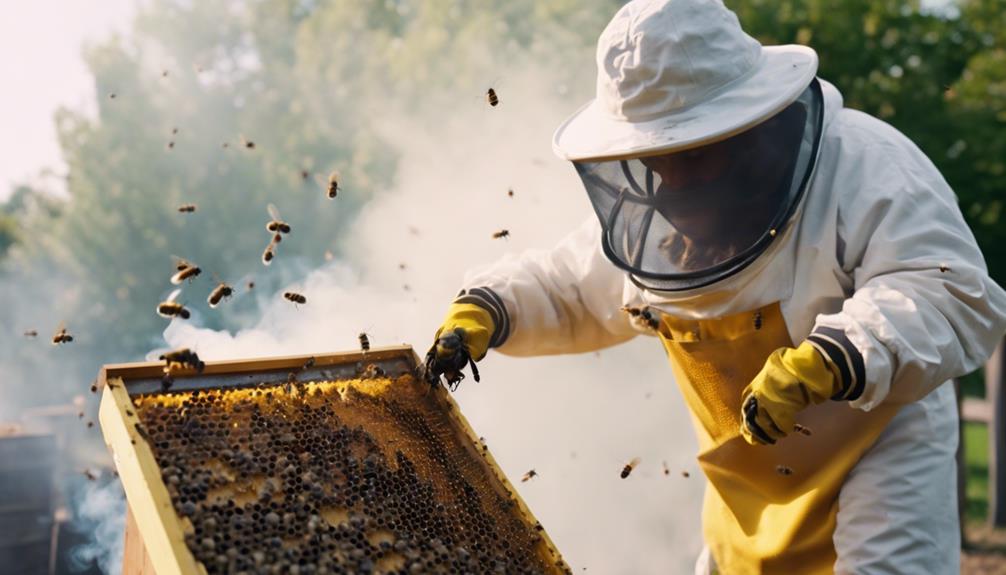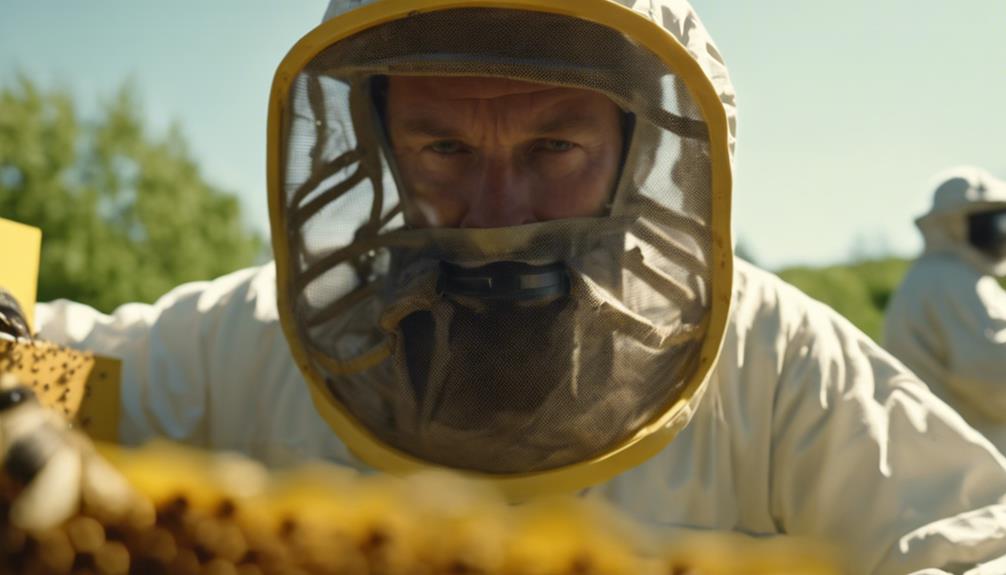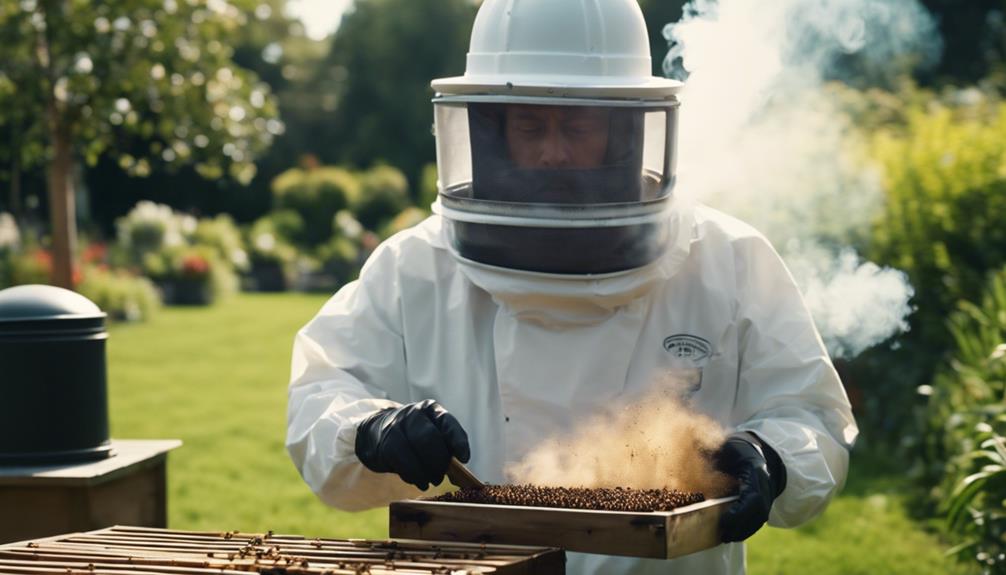Exploring the world of beekeeping fuels and techniques involves discovering what suits your bees best. We choose natural materials such as cotton, burlap, pine needles, and wood chips for the best smoke for our bees. These selections offer a cool and consistent smoke, prioritizing bee health by avoiding harmful plastics and toxic chemicals that can disrupt their behavior and affect honey quality. Using a propane torch for efficient lighting and considering creative recycling of materials like cardboard, paper, and wood scraps can enrich the beekeeping experience. Prioritizing bee safety, selecting the right fuel, and ensuring a calm hive inspection are key practices.
Delve into the realm of beekeeping fuels and techniques to find what works best for your bees.
Main Points
- Use natural materials like cotton, burlap, pine needles for cool, consistent smoke.
- Avoid plastics and toxic chemicals to maintain bee health and honey purity.
- Prioritize efficient lighting tools like a propane torch for quick ignition.
- Recycle materials like cardboard, wood scraps, and dried leaves for sustainable fuel.
- Select fuels with high oil content for long-lasting, calm hive inspections.
Natural Materials for Bee Smoker Fuel
Frequently, we prefer utilizing natural materials like cotton, burlap, pine needles, and wood chips for bee smoker fuel since they excel at producing cool smoke that doesn’t agitate our bees. Among these, cotton stands out for its ability to smolder, offering a gentle, steady stream of smoke that keeps our hive calm.
Burlap, while effective, burns faster, which mightn’t be ideal for maintaining the smoke over a long period. Pine needles and wood chips, on the other hand, provide a consistent cool smoke that blankets the hive without overheating it.
Importance of Avoiding Plastics and Toxic Chemicals
In the realm of beekeeping, avoiding plastics and harmful chemicals in smoker fuel is crucial.
Our small buzzing companions are delicate creatures, and synthetic substances can disrupt their rhythm, affecting everything from behavior to honey quality.
Choosing natural, non-toxic materials not only keeps our bees content and in good health but also guarantees that the delectable honey they create stays pure and unspoiled.
Bee-Friendly Materials
Choosing bee-friendly materials for smoker fuel is vital to safeguarding the health and well-being of our bees. Opt for natural options like pine needles, wood chips, wood shavings, and pine cones to create a safe and effective smoke.
It’s important to steer clear of plastics and toxic chemicals in smoker fuel, as these can harm the delicate balance within the hive. By using eco-friendly and recycled materials, we not only protect our bees but also support sustainable beekeeping practices.
Being mindful of the materials we use in smoker fuel showcases our dedication to the environment and the creatures we care for. Let’s get creative and resourceful in sourcing cost-effective and safe alternatives to nurture a healthier hive and ecosystem.
Harmful Chemicals Risk
To safeguard bee health and hive purity, it’s crucial to avoid plastics and toxic chemicals when selecting smoker fuel. Here are some key points to keep in mind when choosing the best smoke for bees:
- Harmful to Bees: Plastics and toxic chemicals can emit harmful fumes when burned, potentially impacting bee health and the quality of hive products.
- Non-toxic Materials: Opting for natural, non-toxic materials in smoker fuel is a safer and more environmentally friendly choice for beekeepers.
- Sensitivity to Chemical Residues: Bees can be sensitive to chemical residues, underscoring the importance of using clean, natural fuels in bee smokers.
- Overall Well-being: Choosing safe and eco-friendly smoker fuel options contributes to maintaining the well-being of bees and their environment.
Recommended Tool for Lighting the Smoker
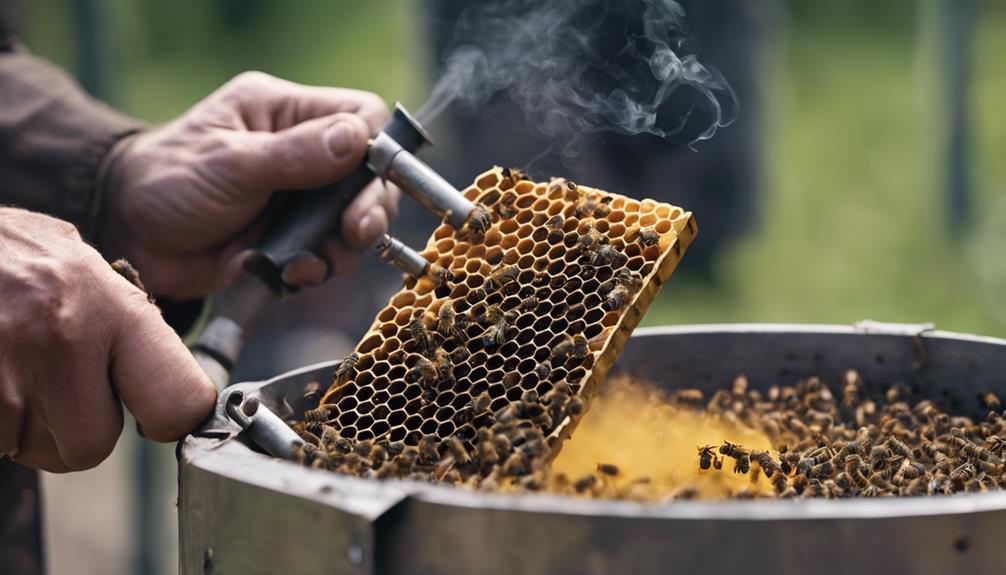
For lighting the smoker, a propane torch stands out as the recommended tool due to its ease of use and efficiency. Propane torches provide a quick and reliable flame source for igniting smoker fuel, ensuring a smooth beekeeping experience.
With a propane torch, you can easily control the ignition process, making it a breeze to start the smoker whenever you need it. The versatility of propane torches extends beyond just lighting the smoker; they can be handy for various beekeeping tasks.
Investing in a propane torch not only saves time but also makes beekeeping more convenient. So, grab a propane torch, light up your smoker, and enjoy a hassle-free beekeeping session with our buzzing friends!
Being Creative and Recycling Materials
Let’s get innovative with our beekeeping practices by creatively repurposing materials for sustainable smoker fuel. Considering the search for the best smoker fuel for our bees, thinking outside the box can lead to exciting discoveries.
Here are some creative ways to recycle materials and create the perfect smoke for your hive:
- Repurpose cardboard, paper, and wood scraps
- Utilize dried leaves, pine cones, or straw
- Combine old cotton clothing, burlap, and natural fibers
- Utilize wood chips or sawdust
Best Practices for Bee Smoker Fuel
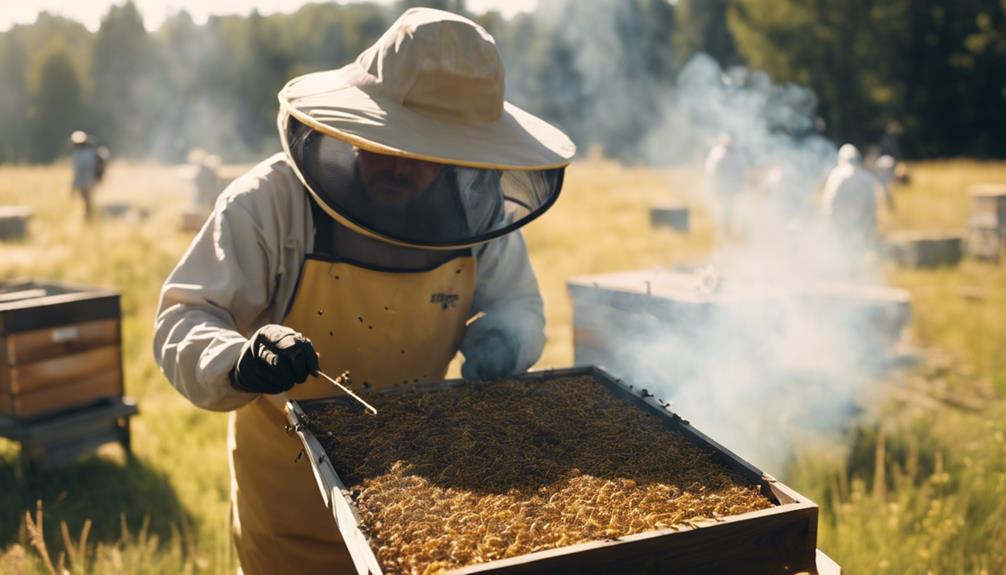
Getting the best smoke for bees involves using natural materials with high oil content like cotton, pine needles, or dried herbs. These options provide a cool smoke that won’t harm the bees and offer a long smoldering burn.
It’s crucial to prioritize bee safety by selecting the right fuel for your smoker. Avoid using burlap, which burns quickly and can endanger the queen bee if embers remain. Opting for synthetic materials or substances like gasoline can have detrimental effects on the bees and contaminate their honey.
Sharing Your Favorite Smoker Fuel Choice
Our preferred choice for smoker fuel is cotton due to its ability to produce cool smoke without any open flame. For beekeepers selecting the best bee smoker fuel, here are some reasons why we love using cotton:
- Essential: Cotton provides a steady burn, ensuring long-lasting smoke for calm hive inspections.
- Regarding beekeepers choosing: The smoke produced by cotton is gentle and won’t agitate the bees, promoting a peaceful environment.
- Easily obtainable: Cotton is easily accessible and affordable, making it a convenient choice for beekeepers.
- Safe for bees: With no open flame, cotton minimizes the risk of accidental fires and protects the delicate bee colony.
Selecting the right fuel is essential for maintaining a harmonious beekeeping experience.
Using Social Media to Share Beekeeping Tips
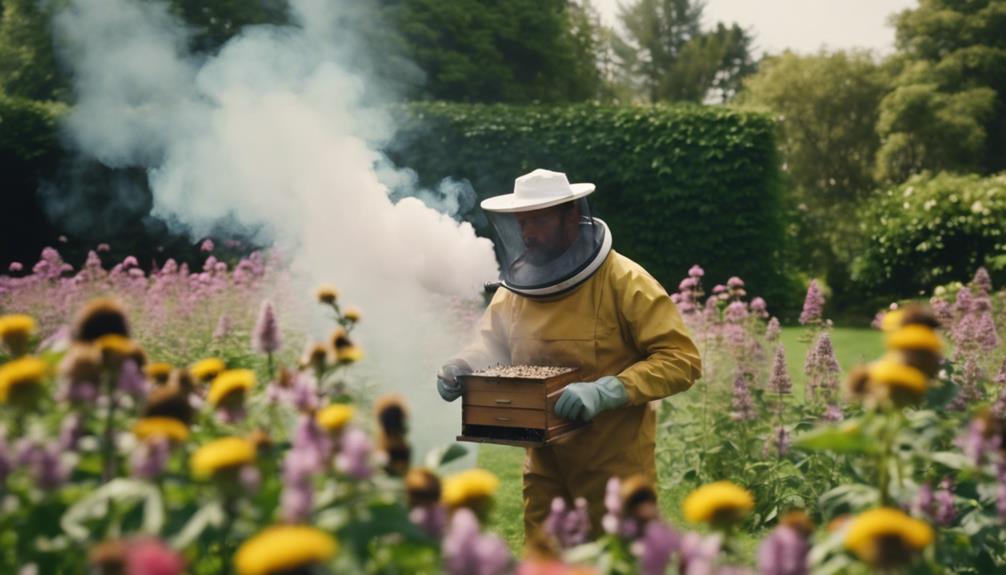
Discussing our beekeeping experiences on social media platforms like Twitter and Facebook can effectively share valuable tips with a broad audience, fostering knowledge exchange and engagement within the beekeeping community. By sharing on Facebook, we can reach fellow beekeepers, novices, and enthusiasts keen to learn more about bees. Posting about beekeeping not only educates others but also creates a sense of community and support among beekeepers worldwide.
Utilizing hashtags like #BeekeepingTips and #SaveTheBees can amplify our reach, ensuring our valuable insights reach a wider audience. Joining beekeeping groups on social media provides a space for networking and exchanging ideas, further enriching our beekeeping journey. Let’s continue to use social media as a powerful tool to spread awareness and knowledge about bees while connecting with like-minded individuals.
Finding Additional Information on Beekeeping
When searching for more insight into beekeeping, exploring online beekeeping forums can be a goldmine of shared experiences and tips from seasoned beekeepers. Additionally, beekeeping books offer in-depth knowledge on hive management, bee behavior, and various techniques that can improve your beekeeping skills.
Both resources provide valuable information to help bee enthusiasts expand their knowledge and refine their beekeeping practices.
Online Beekeeping Forums
In exploring beekeeping forums online, beekeepers can discover a wealth of information on finding the best smoker fuels for bees. These forums are like virtual hives buzzing with shared experiences and recommendations. Here’s what beekeepers can expect to find:
- Insights on the effectiveness, availability, and cost of various smoker fuels.
- Personal anecdotes and tips for calming bees using different types of smoke.
- Expert advice on selecting the most suitable smoke for beekeeping needs.
- Updates on new trends and innovations in smoker fuel options.
Beekeeping Books
Exploring beekeeping books offers valuable insights into hive management, bee behavior, and honey production for beekeepers at all experience levels. Whether you’re a beginning beekeeper keen to learn the basics or an experienced apiarist looking to refine your skills, these books are gold mines of knowledge.
They cover everything from selecting the right equipment to preventing diseases, controlling swarms, and implementing sustainable beekeeping practices. Authored by seasoned beekeepers, researchers, and educators, these books provide reliable information in an accessible format.
Reading them can help you grasp essential beekeeping principles and best practices, empowering you to nurture healthy and productive hives. So, grab a book, cozy up with some tea, and explore the fascinating world of hive management – your bees will thank you!

Hello! My name is Noel Calvin. I graduated from UCLA and now work as a writer at Launch Ninjas. I write blog posts that inspire and guide our readers in their entrepreneurial pursuits. I live in Pleasantville, NJ, with a peaceful yet lively atmosphere that inspires me.
Writing stories is more than just a job for me. It allows me to share my observations and satisfy my curiosity about the world. I combine my analytical skills with creative enthusiasm to delve into technology trends and startup stories. But my life isn’t limited to screens and keyboards. I value loyalty, passion, and a touch of old-fashioned charm, which I infuse into every narrative I create.
I love spending time in my garage, jamming with my band when I’m not writing. Playing the guitar and singing bring me immense joy. I also enjoy capturing ordinary and extraordinary moments through my camera lens and exploring new culinary adventures that excite my taste buds. I’m always seeking new experiences.
My family is very important to me. Joyful Sunday brunches filled with laughter and intense board game nights keep me grounded, reminding me of life’s simple pleasures.
In my world, every moment is an opportunity for discovery. Every discovery is a story worth sharing, whether a heartfelt moment at home or the pulse of technological innovations. Join me as I navigate through life, one blog post, one guitar strum, and one heartwarming family dinner at a time.
